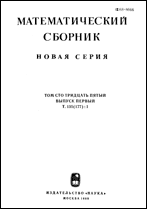|
Localization of ideals and asymptotic uniqueness theorems for functions with restrictions on growth
S. A. Apresyan
Abstract:
Let $\mathbf D=\{z\in\mathbf C:|z|<1\}$; let $U_\varphi(\mathbf D)$ be the set of all functions $u$, subharmonic in $\mathbf D$, for which $u(z)<C_u\varphi(1/(1-|z|))$; and let $A_\varphi(\mathbf D)$ be the algebra of all functions $f$, analytic in $\mathbf D$, for which $\log|f(z)|<C_f\varphi(1/(1-|z|))$. We prove the following theorems subject to known
restrictions on the regularity of growth of the function $\varphi$.
Theorem 1. If $\gamma$ is a continuous curve in $\mathbf D$ reaching out to the circle $\partial\mathbf D$ (i.e., $\gamma\cap\partial\mathbf D\ne\varnothing$), and if
$$
\varlimsup_{z\in\gamma,|z|\to1}\frac{u(z)}{\varphi^*(1/(1-|z|))}=-\infty,
$$
then $u\equiv-\infty$.
Here, $\varphi^*(t)=t\bigl(\int_1^t(\varphi(x)/x^3)^{1/2}\,dx\bigr)^2$ for $a_\varphi\leqslant1$, $\varphi^*=\varphi$ for $1<a_\varphi\leqslant+\infty$;
and $a_\varphi=\lim_{x\to\infty}\varphi'(x)x/\varphi(x)$.
Theorem 2. {\it In order that every closed ideal of the algebra $A_\varphi(\mathbf D)$ be a divisor ideal, it is necessary and sufficient that the condition $\int_1^\infty(\varphi(x)/x^3)^{1/2}\,dx=+\infty$ be satisfied.}
Here, we say that an ideal $I$ is a divisor ideal when $I=\{f\in A_\varphi(\mathbf D):k_f\geqslant k_I\}$, where $k_f(\xi)$ is the multiplicity of a zero of the function $f$ at the point $\xi$ and $k_I(\xi)=\min_{f\in I}k_f(\xi)$.
Figures: 5.
Bibliography: 33 titles.
Received: 17.11.1977
Citation:
S. A. Apresyan, “Localization of ideals and asymptotic uniqueness theorems for functions with restrictions on growth”, Math. USSR-Sb., 34:5 (1978), 561–592
Linking options:
https://www.mathnet.ru/eng/sm2550https://doi.org/10.1070/SM1978v034n05ABEH001323 https://www.mathnet.ru/eng/sm/v148/i1/p3
|


| Statistics & downloads: |
| Abstract page: | 273 | | Russian version PDF: | 88 | | English version PDF: | 21 | | References: | 60 | | First page: | 1 |
|




 Contact us:
Contact us: Terms of Use
Terms of Use
 Registration to the website
Registration to the website Logotypes
Logotypes







 Citation in format
Citation in format 